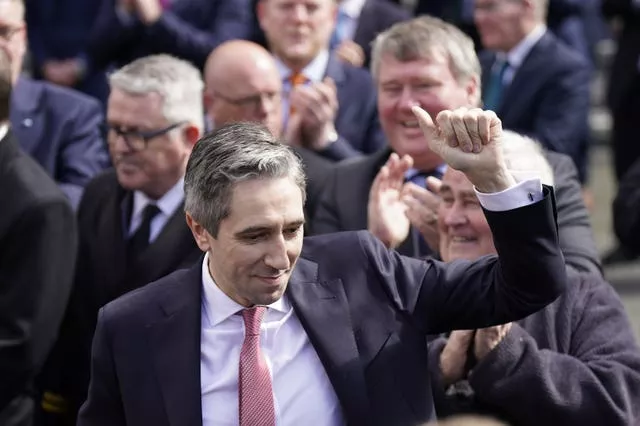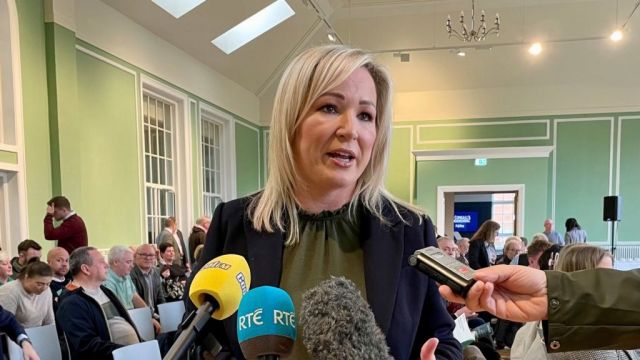Northern Ireland First Minister Michelle O’Neill has warned Taoiseach Simon Harris that he cannot hide his head in the sand on Irish unification.
The Sinn Féin vice president and was responding to Mr Harris’ assertion that pressing for unity was not currently a priority for him.
Ms O’Neill said the debate on constitutional change was a “very live one” and the Government needed to commence preparatory work in advance of any future border poll.

Asked for her response to Mr Harris’ recent remarks on unity, she told reporters in Belfast: “I think that there’s no escaping the fact that the debate around constitutional change is a very live one, and more and more people are entering into that conversation, which is a healthy thing.
“Let’s have the maturity in which to deliver good public services, do what we have to do in government, but also have the maturity to alongside that have a very pragmatic conversation about constitutional change – what that might look like and Fine Gael shouldn’t put their head in the sand on that.
“They need to be engaged in the conversation and I would encourage the Taoiseach now that he is in post now to bring about the work in terms of planning for constitutional change. Let’s have the citizens’ assembly (on unity). Let’s have the debate around education, health, what does the future look like for our economy across the island?”
While new Fine Gael leader has said the reunification of Ireland should not be a priority at the present time, he has insisted he remains committed to the objective and hopes he will see it achieved in his lifetime.
Attending the launch of a new Sinn Féin paper on tackling sectarianism and segregation on Wednesday, Ms O’Neill was also asked by reporters whether she had concerns over Mr Harris’s perceived relative lack of ministerial experience dealing with issues related to Northern Ireland.

She said it was really important that Mr Harris made a visit north of the Border in the near future. Ms O’Neill said she intended to speak to the Taoiseach within 24 hours.
“We’ve had some experience in this over the past number of years in terms of the changes of taoiseach,” she added.
“But, for me, what’s important here is that the Taoiseach, as head of the Irish Government, is responsible as co-guarantor for the Good Friday Agreement. So it’s really important that the Taoiseach is here in the north, that he is here to further the work that we discussed at the North South Ministerial Council meeting on Monday past.
“So there are huge opportunities, I think, now for a refresh of the north-south relations and for that co-operation across the island. So I would be looking forward to speaking to the Taoiseach in the next short while and to inviting him to the north in terms of being able to further some of that conversation.”

Addressing the Dáil on Tuesday, Mr Harris pledged to honour his role as a protector of the Good Friday Agreement as he stressed that peace on the island should never be taken for granted.
He said he looked forward to working with counterparts in the Northern Ireland Executive.
In one of his last engagements as higher education minister, Mr Harris joined colleagues from the Irish cabinet and Stormont ministers at the meeting of the North South Ministerial Council in Armagh on Monday.
He referenced the gathering in his address to the Dáil after being nominated as Ireland’s new premier.
“As Taoiseach, I pledge to guard and honour my role as protector and guarantor of the Good Friday Agreement,” he added.
“We have so much more to achieve for all communities on this island, and I look forward to working very much with the Northern Ireland Executive because Ireland must never take peace or freedom for granted.”
In remarks on unity at the weekend, Mr Harris said cost should not be the overbearing factor in consideration of a United Ireland.
On Sunday, he was asked about the findings of a new study from the Dublin-based Institute of International and European Affairs (IIEA) that suggested unification could cost the Irish government €20 billion a year for 20 years, with a 25 per cent increase in taxation potentially needed to shoulder the costs of uniting Northern Ireland and the Republic of Ireland.
“Instinctively, I want to see a united Ireland and cost isn’t the overbearing factor,” Mr Harris told RTÉ in response to the report’s findings.
But he stressed his priority was harnessing the “full potential” of the Good Friday Agreement and building better cross-border relations.
Mr Harris said he would not be dismissive of the IIEA report but said its findings had prompted a lot of scrutiny.
“There’s a dynamic effect to any economic change, but the point is the Good Friday Agreement provides a way forward for people’s political aspirations,” he said.
“The priority right now, in my view, for the people on the island of Ireland is to live in peace, live in prosperity, get to know each other better.”







